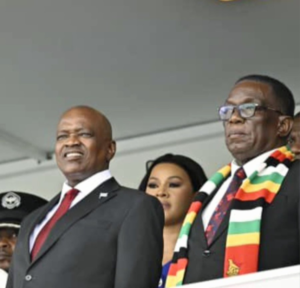OPPOSITION’S MISSTEP HANDS ZANU PF A SILVER PLATTER VICTORY

In a dramatic twist of political fate, the opposition Citizens Coalition for Change (CCC) has inadvertently bolstered the ruling party, Zanu PF, granting them a powerful parliamentary two-thirds majority in the House of Assembly. This unexpected turn of events, masterminded by CCC’s self-imposed secretary-general, Sengezo Tshabangu, along with his close associates, represents a significant setback for the opposition’s aspirations and a notable victory for Zanu PF.
Tshabangu, alongside his faction of political strategists, orchestrated a series of maneuvers that effectively fractured the opposition’s unity and diluted its influence within Zimbabwe’s political landscape. By engaging in internal sabotage, they managed to erode the hard-won political ground the opposition had painstakingly gained over the years. This group of plotters not only disrupted the opposition’s cohesion but also facilitated the transfer of power back to Zanu PF, essentially on a silver platter.
The ramifications of this political upheaval are profound. With a two-thirds majority in the Lower House now securely under its belt, Zanu PF has been handed an unprecedented level of control and influence over the country’s legislative process. This majority enables the ruling party to propose, amend, and enact legislation with relative ease, significantly impacting the nation’s governance and future policy directions. Although Zanu PF has not achieved the same level of dominance in the Senate, its current position in the Lower House presents ample opportunity to advance its agenda.
The strategic blunder by Tshabangu and his allies has not only reshaped the balance of power in Zimbabwe’s House of Assembly but also cast a shadow over the opposition’s credibility and effectiveness. Critics argue that this self-inflicted wound undermines the broader struggle for democracy in Zimbabwe, diluting efforts to foster a more inclusive, representative, and fair political system.
In the wake of this development, Tshabangu and his group appear to be positioned to negotiate their terms with the ruling party. Speculation abounds that their disruptive actions could be rewarded with financial compensation, political appointments, or a combination of both, further entrenching their influence and securing their personal interests at the expense of democratic integrity.
For Zanu PF, this newfound legislative strength opens a pathway to constitutional amendments that could further entrench the party’s dominance in Zimbabwean politics. The party’s ability to potentially alter the constitution hinges on its capacity to negotiate with and sway compromised opposition members and other special constituencies in the Senate. If successful, Zanu PF could secure an absolute majority in the legislature, granting it unprecedented power to shape the nation’s legal and political framework according to its vision.
This development raises critical questions about the future of democracy in Zimbabwe. The opposition’s inadvertent empowerment of Zanu PF underscores the fragility of political alliances and the importance of strategic unity in the face of authoritarian tendencies. As the nation grapples with this unexpected shift in power dynamics, the spotlight falls on the opposition to reassess its strategies, rebuild its unity, and reinvigorate its commitment to democratic principles.
In summary, the opposition’s strategic missteps have not only handed Zanu PF a significant legislative advantage but also posed serious challenges to the democratic process in Zimbabwe. The unfolding scenario serves as a stark reminder of the complexities of political maneuvering and the critical need for vigilance, unity, and strategic foresight in the pursuit of democracy and governance.



